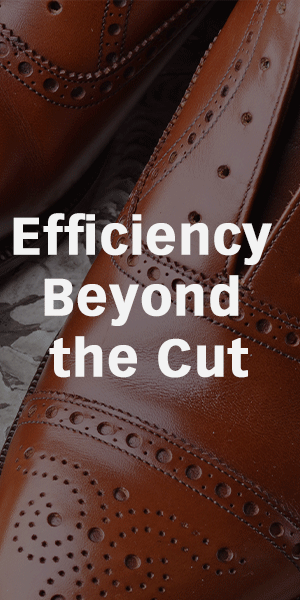Robot-aided cementing of uppers and soles

Manual labour still accounts for a major share of the work involved in producing roughly 90% of the global output of footwear. However, the trend towards process automation and standardisation is also picking up speed and there are many reasons for this.
Consumer behaviour increasingly focuses on product quality, which therefore needs to be raised to a consistent and reliable level. Production levels must be maintained while costs ideally need to be lowered. Materials and additives have to be used as economically as possible and employees freed from strenuous work wherever possible. Sustainability issues are a further concern and reducing environmental pollution during the production process has become increasingly important.
Desma Schuhmaschinen GmbH has been developing innovative plant systems and pioneering robot integration since the 1980s. With more than 1500 robots in use worldwide, it is a frontrunner in the field of automation and offers solutions for production automation in response to all of these demands.
Amir c
In its AMIR C (automated material supply with integrated robots – cementing) product portfolio, the company offers automated tooling cells and production lines, inclusive of supporting operations for preparing uppers and soles for the cementing process. In companies producing sports and casual footwear as well as those focussing on trekking boots or safety shoes, these processes are still performed largely by hand. By automating them, producers can improve their product quality and control their production processes more reliably by increasing precision and repeatability.
Furthermore, a controlled production process also reduces the amount of consumables used and relieves staff from physically exhausting and monotonous tasks.
For example, Desma has developed a particularly efficient automated tooling cell for the precise and reproducible application of primer and cement to soles as part of its AMIR C system. This cell can be used as a stand alone solution or, alternatively, integrated into a production line. The robot applies exactly the required amount of primer or cement, leading to significantly lower consumption of process chemicals. In another configuration, a similar cell can also be integrated into the production line to automatically roughen the surface of the lasted upper following a defined tooling path. This is performed by a roughing robot which roughens individual contours and delivers consistently good results.
In addition to these cell solutions, a typical AMIR C production line consists of several process stations and robot applications. At the start of the line, soles and lasted uppers are inserted manually and a camera supports the position of the uppers on the last, while the contours of the corresponding soles are automatically scanned (Fig 1). Once the production instructions have been loaded using RFID or barcode technology, the production and control software obtains the exact data and contour lines needed for further processing during the subsequent production stages. Amongst other things, for example, the spray robot follows the outer contours of the sole and the lasted upper precisely and applies exactly the required quantity of water-or solvent-based primer and/or cement (Figs 2, 3). The soles and lasted uppers then pass through various conditioning elements, before reaching the automatic bottoming cell which assists the operator to perform the sole laying operation under optimal conditions and also manages flow up to the final pressing operation (Fig 4).
Flexibility
The option of scanning each individual sole and the need to last each upper on a highly precise last ensure the robots can perform each tooling operation automatically without the need for any complicated reprogramming or retooling (main image). This means that AMIR C can be used for large or small production batches extremely flexibly and with short cycles. Fluctuations in working and processing quality are virtually eliminated, which minimises production costs. Robots also improve safety, while automation solutions improve general working conditions, as employees no longer have to be protected from direct contact with cement fumes.
Support
When it comes to planning and designing AMIR C systems, Desma provides support and advice right from the start. The production cells and lines are designed to meet individual customer requirements and conditions at their production site. The systems themselves are produced in Desma’s factory at Achim in Germany where they undergo thorough and comprehensive trials and tests prior to delivery. They are then transported and assembled at the customer’s factory, where the robots are commissioned by Desma engineers together with the customer. Global support and maintenance services ensure that customers can contact an expert at any time if they need spare parts or wish to enlarge their systems. Desma managing director Klaus Freese states, “We don't leave our customers after the start of production, but support them through a variety of channels, online or in person, throughout the entire service life of the system.”
ALL CREDITS: DESMA












